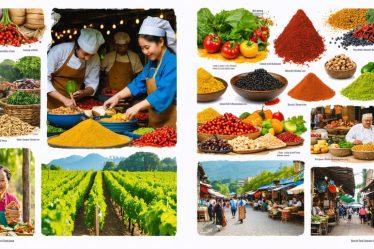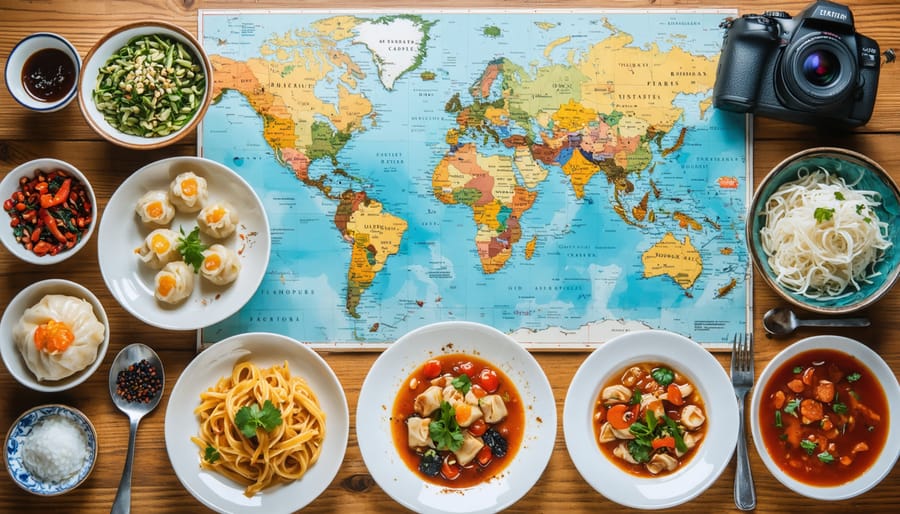
Picture yourself wandering through a bustling spice market in Marrakech, mastering pasta-making alongside a nonna in Tuscany, or discovering the secret to perfect dim sum in Hong Kong. Culinary getaways transform your kitchen skills into global adventures, creating memories that last far longer than any souvenir.
These immersive food-focused journeys offer more than just exceptional meals – they’re windows into local cultures, traditions, and ways of life. Whether you’re learning traditional cooking techniques in a centuries-old Thai kitchen or sampling wine in a family-owned Portuguese vineyard, each experience adds a new chapter to your personal cookbook of travel stories.
The beauty of culinary travel lies in its ability to engage all your senses: the sizzle of fresh ingredients hitting a hot wok, the aromatic blend of unknown spices, the vibrant colors of local produce markets, and the warmth of sharing meals with new friends from around the world. It’s about stepping out of your comfort zone and into kitchens where generations of food wisdom await.
Ready to pack your appetite and sense of adventure? Let’s explore how to craft the perfect food-focused escape that satisfies both your wanderlust and your palate.
Why Food Should Be Your Next Travel Guide
Beyond Tourist Traps
Food has an incredible way of connecting us with local culture that typical tourist activities just can’t match. Last summer, while exploring a small town in Tuscany, I skipped the crowded museums and instead found myself in Maria’s tiny kitchen, learning her family’s centuries-old pasta-making secrets. These authentic culinary experiences offer a genuine glimpse into daily life and traditions that you won’t find in any guidebook.
When you plan your culinary getaway, look beyond restaurant ratings and seek out cooking classes with local families, morning market tours with neighborhood guides, or family-run food festivals celebrating regional specialties. These experiences not only fill your stomach but also feed your soul with stories, traditions, and connections that last long after the meal ends.
Remember, some of the most memorable food experiences happen in humble settings – like that unforgettable bowl of pho served from a street cart in Hanoi, or the life-changing olive oil tasting at a small family farm in Greece. By choosing food as your compass, you’ll naturally venture off the beaten path and discover the heart of a destination through its flavors and the people who create them.
Creating Lasting Memories Through Taste
Have you ever noticed how certain flavors can instantly transport you back to a cherished vacation moment? That’s the magic of culinary travel – it creates magical culinary experiences that become forever woven into the fabric of our memories.
I’ll never forget my first bite of authentic pasta al limone in a tiny Amalfi Coast restaurant, where the zesty brightness of local lemons merged with the warmth of Mediterranean hospitality. It wasn’t just about the food – it was the gentle sea breeze, the clinking of wine glasses, and the laughter shared with new friends that made that moment unforgettable.
Food has this remarkable ability to engage all our senses at once, creating deeper, more vivid memories than almost any other travel experience. Whether it’s the aromatic spices of a Moroccan souk, the sizzle of street food in Bangkok, or the ritual of afternoon tea in London, these sensory moments become treasured stories we carry with us forever.
The beauty of culinary travel lies in its power to connect us – not just to places, but to people, traditions, and cultures through the universal language of food.
Planning Your Perfect Culinary Getaway
Choosing Your Culinary Destination
Selecting your culinary destination is like choosing the perfect ingredient for a recipe – it can make or break your foodie adventure. I learned this firsthand when I accidentally booked a truffle-hunting trip to Italy in the wrong season! Now, I always start by considering what foods I’m most excited to experience and when they’re at their peak.
Consider seasonal specialties in your timing: visit Japan during cherry blossom season for special sakura-themed dishes, or plan your trip to Provence when the lavender is in bloom for unique herb-infused cuisine. Think about what makes your taste buds dance – are you craving fresh seafood? Consider coastal destinations like Maine or the Mediterranean. Passionate about wine pairings? Regions like Bordeaux or Napa Valley offer incredible farm-to-table experiences alongside their vintages.
Don’t forget to research food festivals and harvest seasons. There’s something magical about experiencing Spain’s tomato harvest or attending a cheese festival in the Netherlands. Local food calendars can be your best friend here – they’ll tell you exactly when specific ingredients are at their prime.
For first-time culinary travelers, I recommend choosing destinations known for their cooking classes and food tours. Cities like Bangkok, Barcelona, and Bologna offer amazing opportunities to learn while you eat. Remember, the best culinary destinations aren’t always the most obvious ones – sometimes small towns and rural areas offer the most authentic and memorable food experiences.
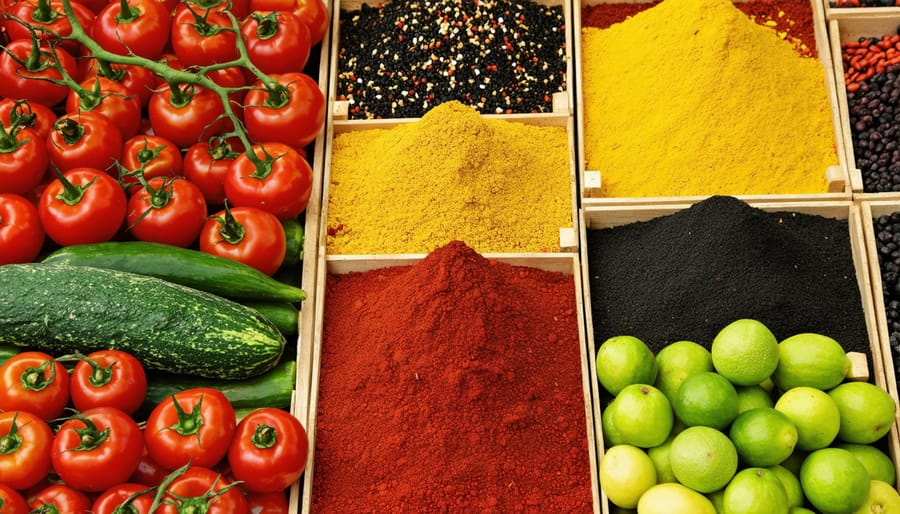
Must-Try Experiences
When I planned my first culinary getaway to Tuscany, I quickly learned that cooking classes are just the beginning of what’s possible. The best food-focused trips weave together various experiences that engage all your senses and connect you with local culture.
Start by booking a market tour with a local chef – there’s something magical about learning to select the freshest ingredients while chatting with vendors who’ve been perfecting their craft for generations. I still remember the elderly cheese maker who taught me the proper way to store mozzarella!
Consider scheduling a farm-to-table experience where you can harvest ingredients yourself before preparing them. Whether it’s picking olives in Greece or gathering fresh herbs in Provence, these hands-on activities create unforgettable memories.
Wine or spirits tastings are essential companions to culinary adventures. Look for experiences that go beyond basic sampling – perhaps a blending workshop or a visit to family-owned vineyards where you can learn about traditional production methods.
Don’t overlook street food tours, which offer an authentic taste of local life. Some of my most memorable meals have been discovered while exploring hidden food markets and local haunts with knowledgeable guides.
Finally, consider unique experiences like truffle hunting in Italy, chocolate-making workshops in Belgium, or traditional bread-baking classes in France. These specialized activities often become the highlights of your culinary journey.
Balancing Your Schedule
Creating the perfect balance during your culinary getaway is like orchestrating a delicious three-course meal – it’s all about timing and variety! I learned this lesson during my first cooking retreat in Tuscany, where I initially tried to pack every minute with activities and ended up feeling overwhelmed rather than inspired.
Start by planning one major cooking class per day, preferably in the morning when your energy is high and your creativity is flowing. These hands-on experiences typically last 3-4 hours, leaving you plenty of time to explore other aspects of your destination’s food scene.
Schedule market visits to coincide with your free time between activities. I love visiting local markets mid-morning after breakfast but before lunch, when vendors are still well-stocked but the initial morning rush has subsided. This is also the perfect time to pick up ingredients if your accommodation has a kitchen for experimentation.
For restaurant experiences, alternate between casual lunch spots and more formal dinner venues. This gives you a broader perspective of the local food culture while maintaining a comfortable pace. Don’t forget to leave some unplanned meals – some of the best culinary discoveries happen when you spontaneously follow the aroma of freshly baked bread or the recommendations of friendly locals.
Remember to build in rest periods, especially after intensive cooking sessions. Use this time to journal about recipes you’ve learned or simply savor a coffee at a local café, watching the world go by.
Making the Most of Your Food Journey
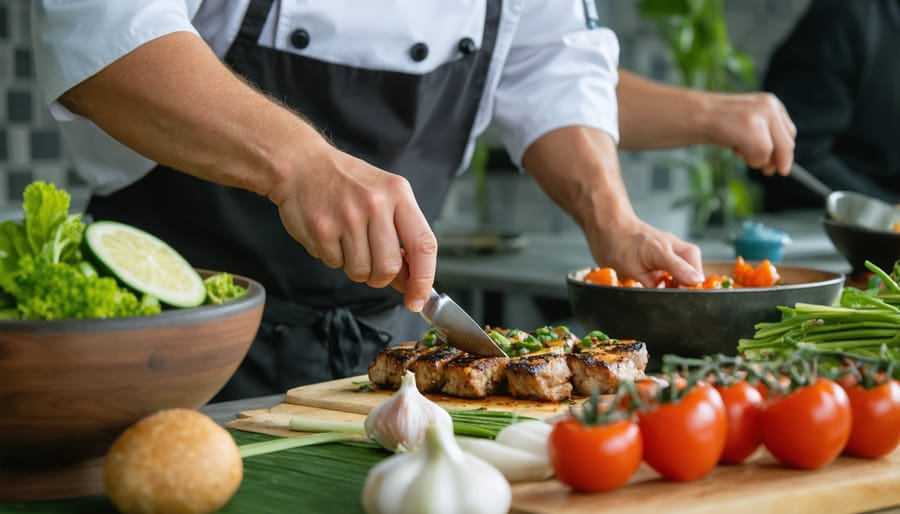
Connecting with Local Food Experts
One of my favorite memories from a trip to Tuscany was learning to make pasta from Maria, a local nonna who welcomed me into her centuries-old kitchen. Finding these authentic experiences isn’t as difficult as you might think – you just need to know where to look!
Start by exploring platforms like Airbnb Experiences, EatWith, or Traveling Spoon, which connect travelers with local hosts offering cooking classes and food tours. These platforms include reviews and detailed descriptions, making it easier to choose experiences that match your interests and comfort level.
Social media can be your best friend in finding food experts too. Instagram’s location tags and food-related hashtags often lead to local chefs and food tour operators. Don’t be shy about sliding into their DMs – many are happy to arrange private experiences or share recommendations!
For a more structured approach, consider working with specialized culinary tour companies. They often have established relationships with local experts and can arrange everything from market tours to private cooking sessions in family homes.
Here’s a pro tip: reach out to food bloggers who live in your destination city. Many offer personalized tours or can point you toward hidden gems that tourists rarely discover. Local cooking schools are another excellent resource – they frequently host visiting chefs and seasonal workshops that visitors can join.
Remember to book well in advance, especially for popular experiences or during peak tourist seasons. And don’t forget to check if your hotel’s concierge can connect you with local culinary experts – they often have access to exclusive experiences that aren’t advertised online.
Capturing Your Culinary Adventures
One of the greatest souvenirs from any culinary getaway isn’t something you can pack in your suitcase – it’s the memories and knowledge you bring home. Documenting your food experiences is essential to preserve these precious moments and skills for years to come.
Start by keeping a dedicated travel food journal. Whether it’s a beautiful leather-bound notebook or a notes app on your phone, jot down the names of restaurants, special dishes, and those little details that made each meal memorable. I still remember the exact way the sunlight filtered through the olive trees during a cooking class in Tuscany, thanks to my detailed journaling.
Don’t forget to photograph your culinary adventures! But instead of just snapping pretty plates, capture the whole story – the local markets, cooking processes, and the lovely people sharing their food knowledge with you. Pro tip: Take photos of menu cards or recipe notes when possible – they’re invaluable when you’re trying to recreate dishes at home.
Speaking of recipes, always ask if you can take notes during cooking classes or demonstrations. Most chefs are happy to share their knowledge, and some might even provide printed recipes. Create a digital folder or physical scrapbook for these treasures, along with any food-related mementos like wine labels or market receipts.
Consider starting a food blog or Instagram account dedicated to your travels. Not only will this help you organize your experiences, but it also connects you with a community of fellow food enthusiasts who can share recommendations for your next culinary adventure.
Bringing the Experience Home
Creating Your Travel-Inspired Kitchen
The magic of culinary travel doesn’t have to end when you return home. Creating a kitchen that celebrates your food adventures can help you recreate travel-inspired dishes and keep those precious memories alive. Start by dedicating a special shelf to ingredients you’ve discovered during your travels – that smoky paprika from Barcelona or the hand-pressed olive oil from Tuscany can transport you back in an instant.
Consider creating a memory wall in your kitchen with food-related photos from your trips, local market postcards, or even framed menus from memorable restaurants. These visual reminders not only add personality to your space but also serve as daily inspiration for your cooking adventures.
Organization is key when building your travel-inspired kitchen. Arrange your spices and specialty ingredients by cuisine or region, making it easier to dive into different cultural cooking experiences. Invest in a few authentic cooking tools that you encountered during your travels – perhaps a tagine from Morocco or a proper paella pan from Spain.
Don’t forget about the power of scent and sound! Keep fresh herbs growing in your kitchen window, and create playlists featuring music from your favorite food destinations. These sensory elements can instantly set the mood for your culinary creations.
Make it a habit to host themed dinner parties celebrating different cuisines you’ve experienced. Share stories about where you discovered certain dishes, and involve friends in the cooking process. These gatherings not only help preserve your travel memories but also create new ones right in your home kitchen.
Remember to keep a travel cooking journal where you can jot down recipes, techniques, and tips learned during your culinary adventures. Include notes about local ingredients and possible substitutes available at home – this will become your personal reference guide for authentic cooking.
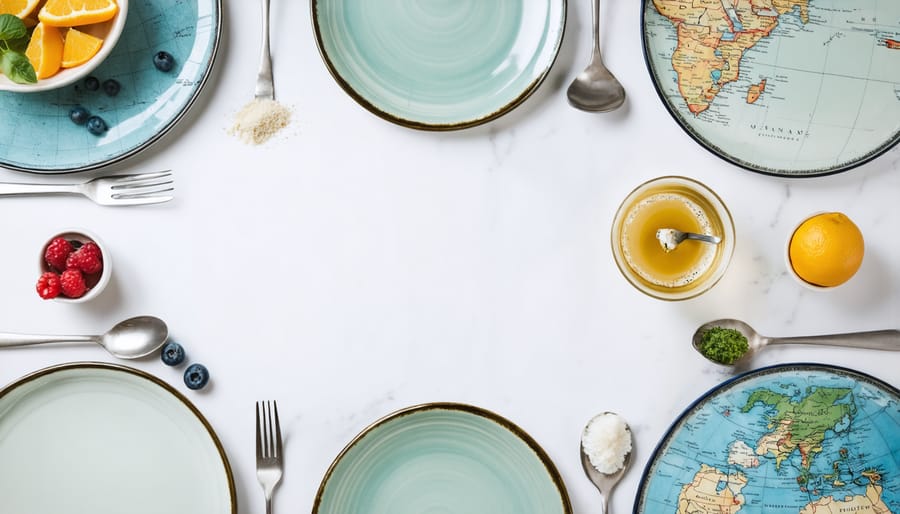
A culinary getaway is more than just a vacation – it’s a journey that transforms how we experience food, culture, and ourselves. Through market visits, cooking classes, and shared meals with locals, we discover that food is the universal language that connects us all. These adventures leave us with more than just wonderful memories and new recipes; they give us fresh perspectives, deeper cultural understanding, and a renewed appreciation for the simple pleasure of breaking bread with others. Whether you’re sampling street food in Bangkok or mastering pasta-making in Tuscany, each bite tells a story and each meal becomes a treasured memory. So pack your appetite and an open mind – your next culinary adventure might just change your life in the most delicious way possible.



